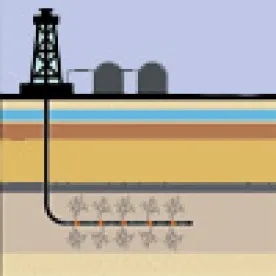The gloves are off in a lawsuit in the Southern District of New York where an insurer and an oil and gas company disagree about whether the company’s insurance policy covers claims that fracking causes earthquakes. On June 27, 2016, insurer Lloyd’s sued New Dominion, arguing that the Lloyd’s pollution liability policies do not provide coverage because fracking is not a “pollution condition.” The Lloyd’s lawsuit relates to five other Oklahoma lawsuits addressing the same issue.
With this lawsuit, the fracking debate moves into a new arena: insurance coverage disputes.
The Earthquake Lawsuits
The underlying Oklahoma cases pit Oklahoma residents and an environmental group against oil and gas companies. These plaintiffs argue that the companies caused significant earthquakes across the state, including in central Oklahoma, by injecting fracking waste water into disposal wells. Some of the lawsuits cite scientific studies or journals, including United States Geological Survey (USGS) studies and Oklahoma Geological Survey presentations, to argue that (1) there is a correlation between increased fracking and increased earthquakes, and (2) waste water injection induces large earthquakes.
The Insurance Action
Cross country to New York: The parties to the New York insurance dispute disagree about whether the fracking claims in the Earthquake Lawsuits are covered “pollution conditions” in the Lloyd’s insurance policies. The policies specifically require Lloyd’s to defend and indemnify New Dominion for lawsuits that seek damages for injury or property damage that “result from pollution conditions” at New Dominion’s fracking sites. The policies define “pollution condition” as “the discharge, dispersal, seepage, migration, release or escape of pollutants” and “pollutant” as “any solid, liquid, gaseous or thermal irritant or contaminant.”
Lloyd’s argues the policies do not cover the Earthquake Lawsuits. It argues it doesn’t have insurance obligations to New Dominion because the waste water is not a “pollutant” under the policies, and the lawsuits do not claim there was property damage that “resulted” from a “pollution condition.” New Dominion disagrees, and argued in a recent motion to dismiss that there is insurance coverage because the Earthquake Lawsuits claim a “pollutant”—fracking waste water—caused the earthquakes. So far, the court has not ruled on whether the insurance policies cover fracking-induced earthquakes.
The Science
There is an ongoing debate about whether fracking activities cause significant earthquakes that endanger the public. In February 2015, an EPA workgroup released a report on seismicity and the injection of waste water from oil and gas activities into disposal wells. The study was designed to help EPA program managers address whether disposal wells could impact waste containment and affect drinking water. Although the study did not examine the extent to which oil and gas production causes earthquakes, it acknowledged that disposal wells have the potential to induce earthquakes and briefly noted there was a “low likelihood” fracking could cause significant earthquakes. It then identified approaches to reduce the likelihood of significant seismic events caused by disposal wells.
Similarly, the USGS has recognized that waste water disposal wells for oil and gas operations can cause earthquakes, and is currently conducting studies that evaluate the hazards of human-induced earthquakes.
Those impacted by fracking will need to wait for answers to these scientific and legal questions. Insurers will be waiting too, as they face lawsuits claiming that fracking activities have caused earthquakes.



 />i
/>i
